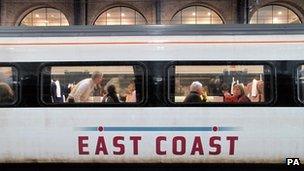East Coast Line: Ministers launch search for buyer
- Published

Passenger numbers have risen by a million under public ownership
Returning the East Coast Main line to the private sector will "revitalise" it, ministers have said as they kick-started the franchising process.
The line has been publicly run since 2009 when National Express handed back the franchise amid financial problems.
Ministers say the line has since been "stabilised" but they now want to "rekindle the spirit of competition".
Labour and the unions say the move is "ideological" and the line should remain in public ownership.
They say the failure of two successive operators to make the line - which runs from London to Edinburgh, with connected services to Inverness and Aberdeen - commercially viable and its improved performance in recent years show it can succeed under public ownership.
The government began the franchising process on Friday by releasing information about the line's financial position as well as the basic criteria for interested parties and details of the commercial risks involved.
'Lagging behind'
The successful bidder is due to be announced in a year's time. The franchise is due to start in February 2015 and is expected to run for a maximum of 11 years.
Among those reported to be interested in bidding is Eurostar, which runs services from London to the Continent.
Transport Secretary Patrick McLoughlin said public ownership was never meant to be a permanent arrangement and returning the operation of the line to the private sector would bring more investment and innovation.
"We want to see a revitalised East Coast railway, one that both rekindles the spirit of competition for customers on this great route and competes with the West Coast on speed, quality and customer service," he said.
Since 2009, the line has been run by Directly Operated Railways, an arms-length company overseen by the Department for Transport.
Figures in Friday's document suggest total journeys on the line have increased by a million to 19.1 million under public ownership while revenue has risen by 11% to £692m.
In the year to October 2013, 89% of East Coast trains arrived at their final destination within 10 minutes of their advertised time, compared to a national average of 92%.
Rail minister Stephen Hammond told the BBC the firm had done a "good job" but the East Coast "lagged behind" other long-distance operators in terms of punctuality while customer satisfaction was only "in line" with other routes.
"There is a lot more that can be done," he said, adding that the doubling of rail passengers since privatisation in the 1990s showed the benefits of the franchise process.
Critics of privatisation say the East Coast line has returned nearly £800m to the taxpayer under public ownership.
But Mr Hammond said this was not a fair comparison as Network Rail had reduced charges for using the track substantially since National Express relinquished the franchise.
'Ideological'
The government says it is already planning "significant" investment in the line over the next six years, including new rolling stock, upgrades to the track around Peterborough and the rebuilding of Doncaster station.
But it wants a private sector operator to "transform the customer experience", develop "innovative timetables" and identify further opportunities for improving stations along the 393-mile London to Edinburgh route.
But Labour said the privatisation process - which was expected to be delayed until after the next election - was being driven by ideological reasons rather than the interests of passengers.
The opposition say the government has "learnt nothing" from the debacle over the West Coast Main Line franchising process last year, which had to be abandoned after mistakes by civil servants led to flawed calculations.
"We think it should be allowed to get on and act as a public sector comparator for the other rail franchises," shadow transport secretary Mary Creagh told the BBC News Channel.
Asked why Labour had changed its policy since 2009, when it said public ownership was temporary, she argued the facts had changed. "We have been very surprised and happy with the directly operated railway...We think, at the very least, it should be able to bid for this franchise."
'Successful and reliable'
The RMT union has pledged to fight the re-privatisation, saying the government is playing down the success of the line under public ownership in order to "bulldoze" the sale through.
Earlier this month it claimed a leaked version of the draft sale brochure redacted sections highlighting the good punctuality and performance of the service under public ownership.
"It is simply outrageous that the government are firing the starting gun on the re-privatisation of the East Coast when every objective analysis shows that this is a successful and reliable service," RMT boss Bob Crow said.
And the TUC said the line needed an operator which would put passengers not shareholders first.
"The government doesn't have one good argument for re-privatising the line and is yet again being blinded by outdated market dogma," said general secretary Frances O'Grady.
But the Rail Delivery Group, which speaks on behalf of commercial train operators and Network Rail, said the rail network had been transformed under such a public-private business model.
"This partnership is a winning formula that is delivering for passengers, businesses and the taxpayer," said the group's director general Michael Roberts.
Consumer watchdog Passenger Focus said it would be scrutinising the tendering process very carefully.
"It has never been more important that companies are publicly held to account for their passenger satisfaction ratings - these must be built into the very heart of the contract," said its chief executive Anthony Smith.
"However, it is good to see the franchise process moving ahead again and unlocking much-needed investment."
- Published18 October 2013
- Published30 September 2013
- Published20 September 2013
- Published6 June 2013
- Published11 July 2013